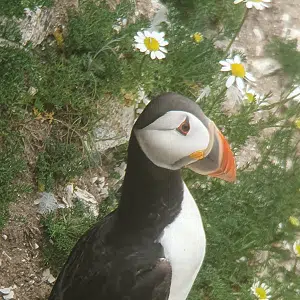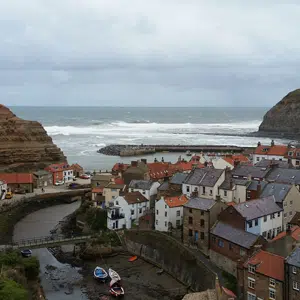On the Yorkshire Coast, Professor Graham Huggan and Dr Sophia Nicolov at the University of Leeds are exploring and drawing together the interconnected histories and legacies of whaling and whale-watching along in the region.
This project seeks to answer several questions about whales and heritage in this region:
- What role have whales and other cetaceans played in coastal and maritime heritage?
- How useful is the history and legacy of whaling to present-day whale-watching activities?
- How can this heritage feed into and support sustainable tourism surrounding whale watching and associated activities, and which will benefit local coastal communities?
- How might scientific research that drives the conservation of cetaceans and their ecosystems be enriched by insights about the cultural significance placed on this group of marine mammals?
Our whaling history
Cetaceans, the collective name given to whales, dolphins and porpoises, have played a role in the lives of Yorkshire’s communities for hundreds of years. Most famously, whalers from Hull and Whitby ventured to the Arctic to hunt bowhead whales, with the industry flourishing from the 1750s until the mid-1800s. Hull and Whitby became major British whaling ports, providing oil for lamps and machinery in the region and beyond. Where whaling ships once set sail, there are now museums which preserve and display this part of Yorkshire’s maritime history: Hull Maritime Museum and Whitby Museum. This is also a region where whales have stranded near human communities for centuries, and continue to do so, offering in different times and contexts food, oil, bones for display, specimens for study and more.
Find out about the Scoresby family’s whaling adventures at Whitby Museum:
Whitby MuseumA new focus
After the end of British commercial whaling in the 1960s and the global whaling industry in the 1980s, there was a change in attitudes towards whales as they came to be understood as charismatic wildlife and sentient animals with complex underwater lives. This shift is part of why people around the world seek encounters with these species which has led to the rise in whale-watching businesses. These animals are the focus of conservation initiatives by organisations like Yorkshire Wildlife Trust, as well as whale watching activities, with Yorkshire Coast Nature running guided whale and seabird boat trips. The history of whaling co-exists with contemporary whale-watching activities and conservation efforts. This heritage is as much about the past as it is about the future, and, on this coastline, it is both natural and cultural heritage which is the focus of protection.
Find out about other nature watching activities on the coast, at the link below:
Watching WildlifeThe accreditation scheme recognises best practices for responsible and sustainable whale and dolphin watching at sites with significant cultural links to cetaceans. It acknowledges regions where the conservation of and education about these animals is encouraged, and where communities have a connection with and celebrate whales and dolphins in local culture, art, history and events. The potential benefits of accreditation include greater awareness of and support for cetacean and ocean conservation initiatives, boosting income to this sector and local communities, and improving education and knowledge about cetaceans and the ocean, ultimately forging a greater connection with these animals and ecosystems.
The project researchers aim to raise awareness about the potential significance of environmental heritage to whale-watching and conservation initiatives and to help create the conditions under which whales and other cetaceans can continue to thrive alongside local coastal communities that benefit from them. They hope to bring to the surface the cultural attitudes and values that lie behind contemporary human-animal interactions, with a view towards developing more inclusive understandings of heritage, conservation and nature that ultimately benefit both humans and cetaceans.
With thanks to Dr Sophia Nicolov for submitting content for this page
Linked projects and further information…




